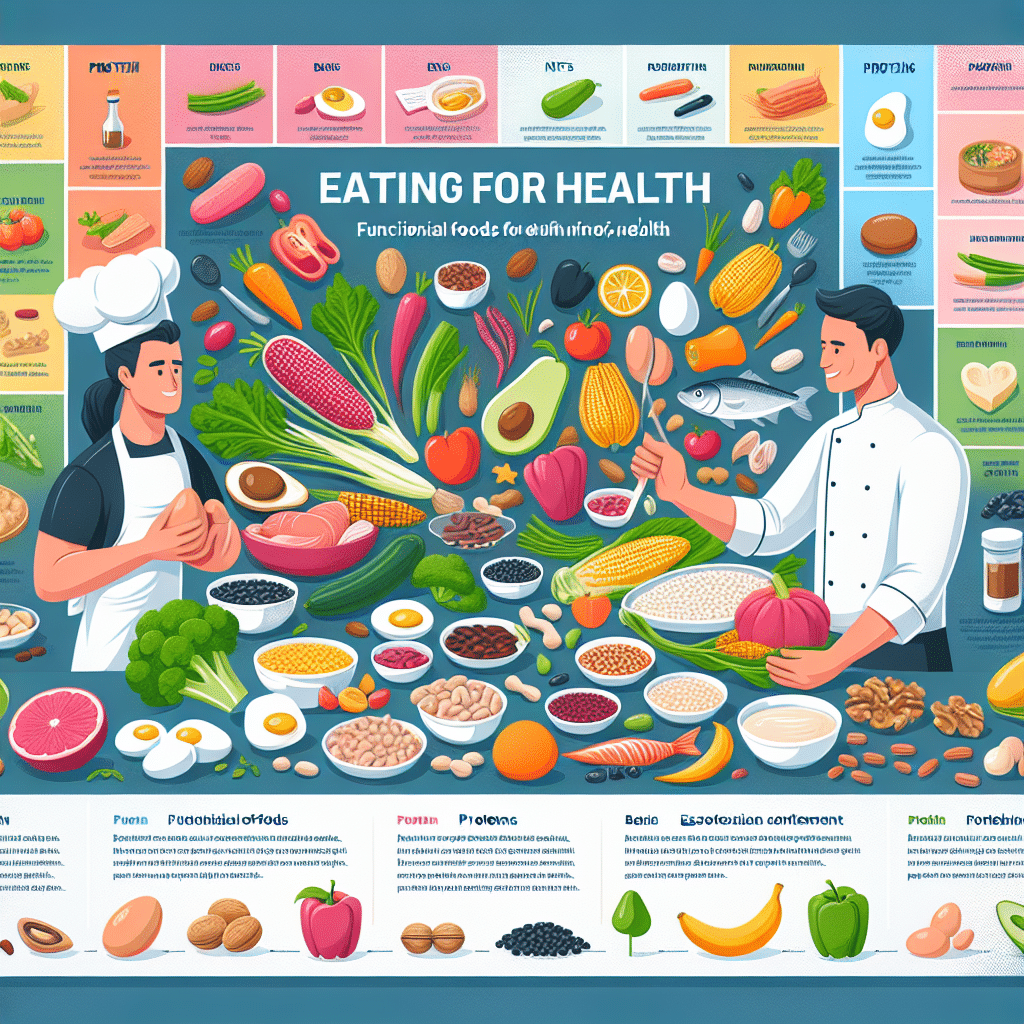Functional Foods and Proteins: Eating for Health
-
Table of Contents
- Functional Foods and Proteins: Optimizing Health Through Nutrition
- Understanding Functional Foods
- The Power of Proteins in Health
- Functional Proteins: A Step Further
- Benefits of Functional Foods and Proteins
- Examples of Functional Foods and Their Impact
- Incorporating Functional Foods and Proteins into Your Diet
- Case Studies and Statistics: The Impact of Functional Foods
- Challenges and Considerations
- Conclusion: Embracing Functional Foods for a Healthier Future
- Discover ETprotein’s High-Quality Protein Products
Functional Foods and Proteins: Optimizing Health Through Nutrition

In the quest for optimal health and disease prevention, the role of diet cannot be overstated. Functional foods and proteins have emerged as pivotal elements in this pursuit, offering benefits beyond basic nutrition. These foods are engineered to provide additional health advantages and are becoming increasingly popular in health-conscious communities. This article delves into the world of functional foods and proteins, exploring their benefits, types, and how they can be incorporated into a daily diet for enhanced health and well-being.
Understanding Functional Foods
Functional foods are foods that have been fortified with additional nutrients or substances that provide a health benefit beyond that of the normal macronutrients they contain. These foods are designed to improve health, reduce the risk of disease, or promote overall well-being. Examples of functional foods include fortified cereals, yogurts with probiotics, and beverages enriched with vitamins or minerals.
The Power of Proteins in Health
Proteins are essential macronutrients that play a critical role in building, maintaining, and repairing tissues in the body. They are also vital for the production of enzymes, hormones, and other substances the body uses to function properly. High-quality protein sources include both animal-based products, such as meat, dairy, and eggs, and plant-based options like beans, lentils, and nuts.
Functional Proteins: A Step Further
Functional proteins go beyond the basic nutritional profile of standard proteins by offering additional health benefits. These proteins may be enriched with amino acids, peptides, or other compounds that can help with muscle recovery, immune support, and metabolic health. Examples include whey protein enriched with branched-chain amino acids (BCAAs) and plant proteins fortified with additional fiber or antioxidants.
Benefits of Functional Foods and Proteins
- Disease Prevention: Many functional foods are designed to help reduce the risk of chronic diseases such as heart disease, diabetes, and cancer.
- Weight Management: High-protein functional foods can help in weight management by promoting satiety and reducing overall calorie intake.
- Improved Digestive Health: Foods with added probiotics or fiber can enhance gut health and aid in digestion.
- Enhanced Immune Function: Certain functional foods contain ingredients that support the immune system, such as omega-3 fatty acids and antioxidants.
- Better Nutrient Absorption: Some functional foods are designed to improve the bioavailability of nutrients, ensuring the body can absorb and utilize them more effectively.
Examples of Functional Foods and Their Impact
Let’s explore some specific examples of functional foods and the research supporting their health benefits:
- Omega-3 Enriched Eggs: Eggs fortified with omega-3 fatty acids have been shown to contribute to heart health and cognitive function.
- Probiotic Yogurts: Regular consumption of yogurts containing live probiotic cultures can improve gut health and may boost the immune system.
- Antioxidant-Rich Beverages: Drinks infused with antioxidants like green tea extract can help combat oxidative stress and may reduce the risk of chronic diseases.
Incorporating Functional Foods and Proteins into Your Diet
Integrating functional foods and proteins into your diet can be simple and delicious. Here are some tips:
- Start your day with a protein-rich smoothie that includes a scoop of fortified plant or whey protein powder.
- Choose bread and cereals that are high in fiber and fortified with vitamins and minerals.
- Snack on nuts and seeds that are high in omega-3 fatty acids and antioxidants.
- Include a serving of probiotic yogurt or kefir in your daily meal plan.
- Opt for lean meats or plant-based proteins that are low in saturated fat and high in essential nutrients.
Case Studies and Statistics: The Impact of Functional Foods
Research has consistently demonstrated the positive effects of functional foods on health. For instance, a study published in the Journal of Nutrition found that consuming omega-3 enriched eggs significantly increased omega-3 fatty acid levels in participants, potentially reducing the risk of heart disease. Another study in the International Journal of Food Sciences and Nutrition highlighted that individuals who consumed high-protein, fiber-rich breakfast cereals experienced improved satiety and reduced subsequent food intake.
Challenges and Considerations
While functional foods and proteins offer numerous health benefits, there are some challenges and considerations to keep in mind:
- Not all functional foods are created equal, and some may contain added sugars or unhealthy fats.
- It’s important to read labels carefully and choose products that align with your health goals and dietary needs.
- Functional foods should complement, not replace, a balanced diet rich in whole foods.
Conclusion: Embracing Functional Foods for a Healthier Future
Functional foods and proteins represent a promising frontier in nutrition science, offering targeted health benefits and supporting overall well-being. By incorporating these foods into a balanced diet, individuals can take proactive steps towards disease prevention, weight management, and improved health outcomes. As research continues to evolve, the potential for functional foods to positively impact public health is substantial.
Discover ETprotein’s High-Quality Protein Products
If you’re looking to enhance your diet with functional proteins, ETprotein offers a range of superior protein products. Their selection includes organic rice protein, clear rice protein, pea protein, clear pea protein, and various seed-based proteins, all characterized by a neutral taste and non-GMO, allergen-free attributes. Ideal for various industries, ETprotein’s products cater to the needs of nutraceutical, pharmaceutical, cosmeceutical, veterinary, and food and beverage sectors. For those seeking tailored protein solutions, ETprotein is a trusted partner, providing comprehensive options to meet all your protein requirements.
About ETprotein:
ETprotein, a reputable protein Chinese factory manufacturer and supplier, is renowned for producing, stocking, exporting, and delivering the highest quality organic bulk vegan protein and plant proteins. They include Organic rice protein, clear rice protein, pea protein, clear pea protein, pumpkin seed protein, sunflower seed protein, mung bean protein, peanut protein etc. Their offerings, characterized by a neutral taste, non-GMO, allergen-free attributes, cater to a diverse range of industries. They serve nutraceutical, pharmaceutical, cosmeceutical, veterinary, as well as food and beverage finished product distributors, traders, and manufacturers across Europe, USA, Canada, Australia, Thailand, Japan, Korea, Brazil, and Chile, among others.
ETprotein specialization includes exporting and delivering tailor-made protein powder and finished nutritional supplements. Their extensive product range covers sectors like Food and Beverage, Sports Nutrition, Weight Management, Dietary Supplements, Health and Wellness Products, and Infant Formula, ensuring comprehensive solutions to meet all your protein needs.
As a trusted company by leading global food and beverage brands and Fortune 500 companies, ETprotein reinforces China’s reputation in the global arena. For more information or to sample their products, please contact them and email sales(at)ETprotein.com today.












